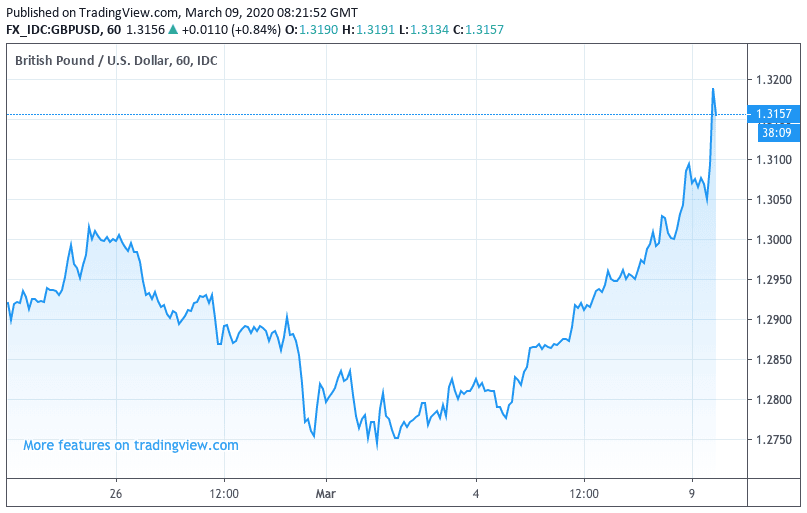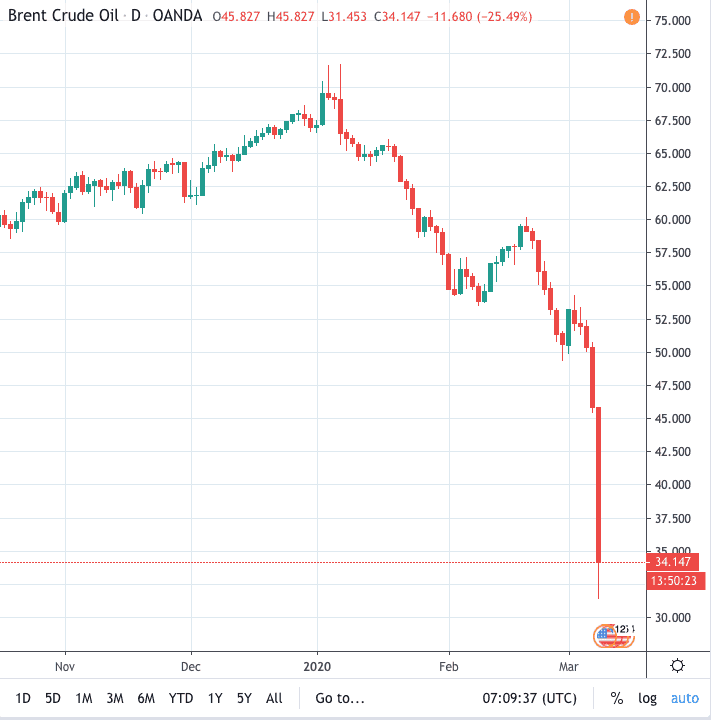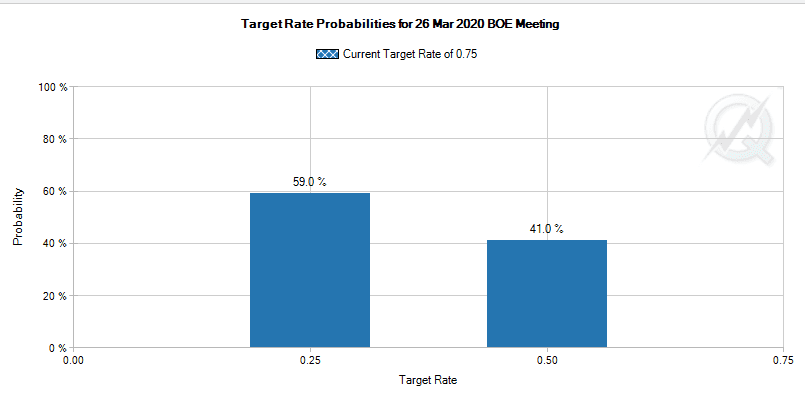Market Meltdown Hits Pound Sterling and Dollar but Triggers Further Demand for the Euro
- Market meltdown extends
- Investors buy the EUR, sell USD and GBP
- Oil slump hits the FTSE 100
- Demand for UK assets to decline
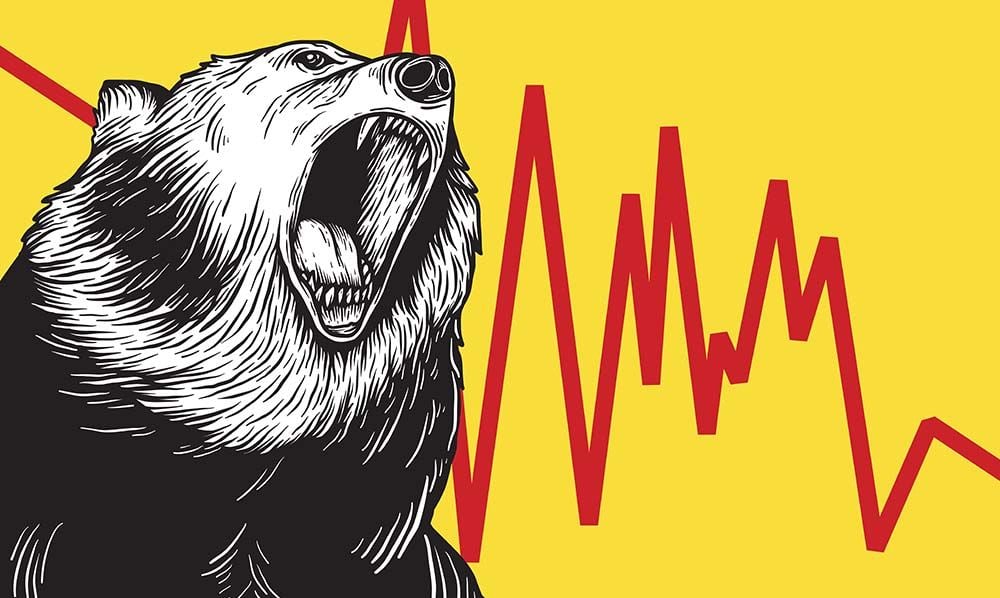
Image © Adobe Images
- Spot rates at time of writing: GBP/EUR: 1.0808, -1.75% | GBP/USD: 1.1852, -2.15%
- Bank transfer rates (indicative): GBP/EUR: 1.0520-1.0596 | GBP/USD: 1.1537-1.1620
- Specialist money transfer rates (indicative): GBP/EUR 1.0650-1.0701 | GBP/USD: 1.1650-1.1745 >> More details
Pound Sterling swooned to a five-month low against the Euro on Monday, March 09 amidst a fresh market panic about the coronavirus outbreak that has prompted significant falls in stocks and oil, but the UK currency is registering advances against the likes of the U.S, Canadian, Australian and New Zealand Dollars.
The oil price fell by 30% (yes, you read that correctly) at the start of trade with WTI now at $30.18 a barrel and Brent crude at $33.50 a barrel. Global stock markets are down sharply with Hong Kong and Indian markets losing over 3.0% in value and China's main market down 3.6%. The FTSE 100 tanked 8.0 at the start of trade, before paring some of those losses to 6%, not surprising given the index's heavy reliance on petro stocks. Germany and France are both 7.0% lower while futures indicate the Dow Jones and S&P 500 will open 5.0% down..
"The main news on COVID-19 over the weekend relates to the economic cost of attempts to control its spread as Italy instituted a lock down on area with a population of 16m which accounts for almost a third of the country’s GDP. News on new infection continued the recent trend – European cases accelerating exponentially, but Asia slowing, with China reporting the lowest level of new cases since January. Markets will today be looking for signals on potential support from policy and expectations are high, Fed Funds futures discounting rates falling to around 10bp by the summer," says Adam Cole, Chief Currency Strategist at RBC Capital Markets.
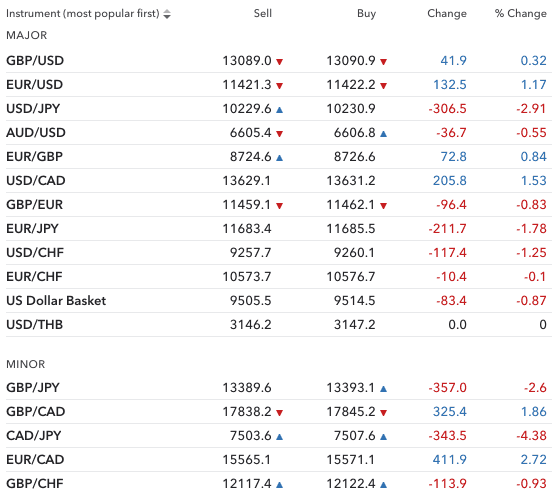
FX market rate snapshot from IG.
A sharp slump in demand for UK stocks and other assets could well be behind Sterling's soft start to the week against the Euro which remains a major beneficiary of the market slump.
The Eurozone's single currency is known as a funding currency, i.e. investors borrow in euros to fund investments in high-yielding assets such as stocks. When stocks sell off, the Euro benefits from a return in funds as investors liquidate positions. The Eurozone might well be the global economy that is most exposed to the coronavirus slump owing to the area's high export dependency, but for now the Euro is in demand as significant sums of capital finds its way back home.
The Euro-to-Dollar exchange rate is quoted at 1.1390 but had earlier on Monday spiked to its highest level in over a year when it reached 1.15. Amidst this surge in demand for euros it is little wonder the Euro-to-Pound exchange rate is also in demand: the pair is up 0.85% since this week's opening level at 0.8727.
This gives a Pound-to-Euro exchange rate of 1.1450, but the pair had gone as low 1.1400 earlier in the session which is its lost level since October 2019.
The Pound is highly reliant on inflows of investor capital to maintain its value and whenever these inflows of capital decline the Pound loses support. "Unlike the U.S., the UK already runs 'triple deficits' (budget, current account and domestic private sector), leaving it heavily reliant on external funding," says Cole.
While the GBP/EUR exchange rate is exposed to broader market trends, the UK currency is however recording strong advances against 'commodity currencies' such as the Aussie and Canadian Dollars which are particularly exposed to shifts in global sentiment and commodity prices.
The Pound is also trading higher against the U.S. Dollar, as the greenback has shown itself to be particularly prone to losses in the current coronavirus-linked market sell-off largely because markets are expecting further agressive interest rate cuts to be delivered by the Fed. When central banks cut interest rates, the rule of thumb goes that the currency they issue falls in value.
"The Pound scaled five-week peaks as plummeting U.S. Treasury yields depicted the Fed on a fast track to slashing borrowing rates towards zero. Broad dollar weakness boosted sterling," says Joe Manimbo, a foreign exchange analyst at Western Union.
The current coronavirus-inspired meltdown in stock markets has seen global investors turn more bearish which inevitably means inflows of foreign investor capital into the UK could be at risk of drying up. However, Viraj Patel, FX & Global Macro Strategist at Arkera, says the Pound might not be as exposed to shifts in investor sentiment as was the case before the EU referendum.
"I had a feeling the pound would outperform (relatively) in the next big global market crash. This isn't the same high-beta pound we saw pre-Brexit. Brexit turned sterling into a cheap currency with little hot money inflows. Hard to have outflows when there's little to flow out," says Patel.
Ultimately, coronavirus fears are the single most important driver of both stocks and currencies at present and with little signs the market panic is about to turn, we would expect further gains in the Euro against the Pound and Dollar while Sterling would be expected to record gains against the likes of the Australian, New Zealand and Canadian Dollars and developing market currencies.
Above: The price of Brent crude plummeted at the start of the new week. Image courtesy of TradingView.
Going forward we expect any upside in the UK currency will ultimately be capped by expectations that the ongoing market meltdown will trigger a response at the Bank of England; futures markets are now showing a 60% expectation that the Bank will cut rates to 0.50% by the end of March.
The Pound tends to decline in value when expectations for an interest rate cut climb, as this further reduces the incentive for global investors to put money into UK financial assets that would offer a superior return. The Bank of England will be keen to mitigate the impact of any global slowdown on the UK economy and could well use their March 26 meeting as a chance to cut rates to 0.50%.
"Global spread of the Covid-19 virus looks likely to cause a worldwide recession and bear market in stocks. Nobody knows how serious the disease is likely to be," says Charles Dumas, Chief Economist at TS Lombard. "The Brookings Institution’s estimates suggest a reasonable likelihood that 10% of the US population will catch the virus, and of those at least 1% will die. As that implies more than 300,000 US deaths, personal fear is rational – there is more to fear than ‘fear itself’.
However, the Bank's Monetary Policy Committee will also have had the benefit of noting how interest rate cuts at the Federal Reserve, Bank of Canada and Reserve Bank of Australia have impacted their respective economies and financial systems. There is a thread of belief amongst economists and financial analysts that the Fed has been exposed as a toothless dog when it comes to fighting market concerns about a supply-side economic shock. i.e., increasing the flow of money into the economy is useless if the goods people and businesses need are simply not there.
This crisis is different to 2008 where a failure of the monetary system starved businesses and individuals of cash; in that instance cutting rates and introducing quantitative easing worked.
Therefore we would not suggest a rate cut at the Bank of England is a foregone conclusion, and we would expect Sterling to rally if rates are left on hold.
Above: Market pricing of a 0.25% rate cut by end March. Image courtesy of CME Group

